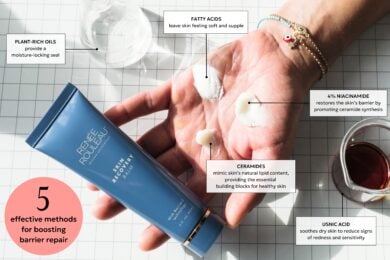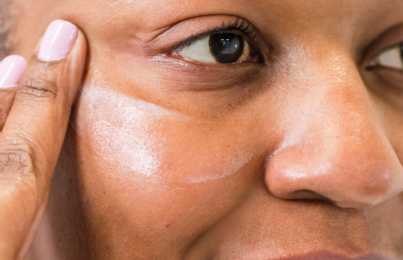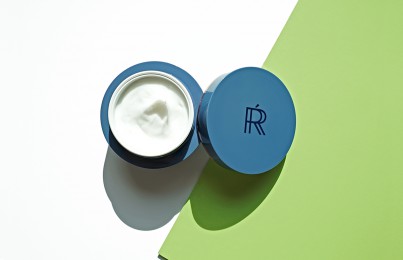Updated 12/18/24. If your skin is feeling dry, tight, and irritated, there is an underlying problem—your moisture barrier is damaged. When people learn this, their first instinct is to layer on a heavy moisturizer, but that won’t fix it. Chances are that you’re doing something day in and day out that’s causing it to stay damaged. The moment you identify (and remove) the culprit, your moisture barrier will naturally repair itself.
Keep reading to learn everything you need to know about your moisture barrier, including what it is, how it works, and what might be damaging it. Plus, learn my expert solutions. You’ll be back to having soft, healthy-looking skin in no time.
What Is a Moisture Barrier?
The moisture barrier is the outermost layer of the skin that helps retain water and provides protection from external aggressors, like bacteria and environmental debris. Think of it like your skin’s personal bodyguard, which helps keep the good in and the bad out. It’s made up of lipids (oils) that bind your skin cells together. When it’s intact, it’s responsible for keeping the skin feeling soft and smooth. When the moisture barrier becomes damaged, small, invisible cracks appear. Through these cracks, moisture can easily escape and irritants can easily enter. The skin may start to feel tight, dry, and sensitive. Essentially, it’s like your skin lost its protective bodyguard. Ouch!
How Can I Tell If My Moisture Barrier Is Damaged?
As an esthetician with 35+ years of experience, I can say that almost every single skin concern can be traced back to a damaged moisture barrier. In fact, not a day goes by that I’m not pinpointing a damaged moisture barrier as the underlying cause of someone’s skin issues.
Common signs of a damaged moisture barrier include redness and rosacea, dryness and dehydration, flakiness and peeling, irritation, itchiness, roughness, a stinging or burning sensation when products are applied, and increased breakout activity. If you experience any or all of these things, no matter your age, you might have a compromised barrier. If that’s the case, keep reading to learn how to fix it.
What Causes a Moisture Barrier to Become Damaged?
There are many different things that can damage your moisture barrier. It could even be a combination of factors, which is why it’s important to be attentive to your skin, as well as your skincare routine and lifestyle habits, to pinpoint the culprit(s). Here are some common causes of damage:
- Over-exfoliation (this is the most common one I see)
- Using drying skincare products (such as alcohol-based toners and high-foaming cleansers)
- Using acidic skincare ingredients (like certain forms of vitamin C that can give a “vitamin acid burn“)
- Washing the face with hot water
- Professional procedures like peels and laser treatments
- Skipping the use of moisturizer
- Too much sun exposure
- Prescription retinoids
- Dry climates and air conditioning
- Using certain skin devices, such as a at-home dermarollers
- Medications that list dryness as a side effect
- Genetics (Some skin types are naturally susceptible to a weak moisture barrier)
- Aging (the moisture barrier becomes more vulnerable after age 45)
8 Ways to Fix a Damaged Moisture Barrier
You haven’t done permanent damage if you’ve been overdoing it with exfoliation for a short period of time. In that case, it’s easily fixable. However, some damage has occurred if you’ve been using harsh products and over-exfoliating for years. Especially if that has gone hand-in-hand with sun exposure. The good news is that it’s never too late to get the skin back to a better place. If you’re making positive changes, I can assure you that you’ll see an improvement. Read on for 10 ways to fix a damaged barrier!
1. Care for Your Skin the Way You Would a Baby’s Skin
If your skin is acting unusually sensitive, a good mindset to have is to care for your skin like you would a baby’s skin. This means keeping everything simple and gentle until it feels back to normal. Go back to basics and lay off potentially irritating active ingredients for some time.
2. Cut Back on Exfoliation
Now that exfoliating products are so popular, many people use them daily. This is hands down one of the biggest and most common contributors to a damaged moisture barrier. When you exfoliate too often, you’re stripping your skin’s protective barrier, which all but guarantees that moisture will escape. This can set off a cascade of inflammation, which not only leads to that uncomfortable dry, tight feeling but also contributes to skin aging.
When you’re trying to fix your moisture barrier, I recommend laying off all exfoliating products for two weeks. Slowly work them back in once your skin feels better. When you reintroduce them into your routine, don’t use them every day. Instead, use them four to five times a week depending on your skin type.
Read my beginner’s guide to exfoliants
Note: If you use a prescription retinoid, know that it works, in part, by breaking down your barrier. While I don’t suggest that anyone stop using one, mainly because it’s so great for getting the skin to look and act younger, I do have some recommendations for how to lessen negative side effects. Read my beginner’s guide to retinol and prescription retinoids.
3. Use a Gentle Cleanser
When fixing a damaged moisture barrier, you’ll want to switch from a foaming cleanser (even if it’s gentle and sulfate-free!) to a cleansing lotion. These cleansers are generally much milder, which is important for dry, tight, or irritated skin.
Read nine surprising cleansing mistakes you need to stop making.
4. Avoid Washing Your Face With Hot Water
Hot water dilates capillaries and raises the skin’s internal temperature. It can also impair the skin’s moisture barrier. That’s why it’s best to use lukewarm water to wash your face—especially in the winter months when the barrier is typically the most fragile.
5. Wear Sunscreen
Sunscreen is the ultimate product for defending your skin from one of the worst sources of environmental damage—the sun. The UVA and UVB rays that are given off by the sun will only contribute to a damaged moisture barrier. That’s why it’s so important to apply sunscreen generously and consistently, rain or shine.
Read this is how much sunscreen you should actually be wearing.
6. Choose a Moisturizer That Contains Specific Ingredients
Moisturizers can certainly aid in fixing a damaged moisture barrier, but it’s important to use those that contain ingredients that mimic the natural lipids found in the skin. And remember, just because a moisturizer feels heavy and greasy doesn’t necessarily mean it will be the best for fixing your moisture barrier. Read why here. It’s all about the ingredients.
Some effective ingredients for barrier repair are borage oil, evening primrose oil, shea butter, phospholipids, niacinamide, ceramides, shea butter and usnic acid.
For quick repair: use Rest Day Masque (it’s great to use as a sleeping masque and is a 2024 Allure Best of Beauty winner!)
For dry skin barrier maintenance: use Skin Recovery Balm (See the five barrier-repairing methods used and how they work)
For acne-prone barrier maintenance: use Skin Recovery Lotion (See this incredible before and after)
Note: You might be looking at some of the above ingredients and think they’d make a rich, greasy moisturizer. That is not the case. A moisturizer can include these ingredients without being heavy and pore-clogging. It all depends on the percentages that are used and the oil-to-water ratio in the formula. Read more about what makes ingredients pore-clogging in this post.
7. Use an Essence
All skin types need water, but when you’re trying to fix your moisture barrier, it’s even more important. After all, when your moisture barrier is damaged, it lets water escape your skin through a process called transepidermal water loss.
One of my favorite ways to deeply hydrate the skin is by using an essence. These products are similar to toners, but they’re serum-infused with water-binding ingredients. They often have a slippery gel-like texture rather than a watery one. My favorite one to use is the Moisture Infusion Toner. It includes phospholipids, moisturizing skin oils, and niacinamide to help strengthen and support the moisture barrier.
Here’s how I recommend using it. Start by washing your face with a cleansing lotion. Then, apply a generous amount of the Moisture Infusion Toner to a Toning Cloth and wipe it over your face. Next, pour a quarter-sized amount into the palm of one hand. Pat the product all over your face using the fingertips of your other hand. Repeat this two more times. Afterward, your skin should feel cool and plump. To finish, seal it in with a serum and moisturizer. I recommend performing this technique twice a day for one to two weeks (although you can certainly make it a year-round habit for hydrated skin).
No matter if you’re using a traditional toner or an essence, apply it within 60 seconds of cleansing. Doing so will prevent water loss. I call this the Golden Minute Rule, and it’s very effective for keeping the skin nice and hydrated.
8. Use Face Oil (the Right Way)
Whenever my clients are in need of a serious fix, I always recommend they use a well-formulated face oil. I suggest patting it over moisturizer as the last step in their nightly skincare routine. This will provide a protective seal over the skin so everything that’s underneath is less likely to evaporate.
How Long Does It Take to Fix a Damaged Moisture Barrier?
If you’re eliminating the things that are causing damage, and you’re investing in the right products to correct it, you should be able to fix your moisture barrier within two to four weeks. For some people, it could be quicker. The skin is truly incredible in that it’s always working to address whatever stressors come its way. That’s why you want to work with it, not against it.
There is really no reason anyone should suffer from dry, tight, or irritated skin. We have advanced so much in skincare. It’s truly an easy fix if you have the right products and at-home regimen.
I hope you found this post helpful. I also hope your skin will return to softer, calmer, and more hydrated state soon.
Next, Read five skincare mistakes everybody makes!
Celebrity Esthetician & Skincare Expert
As an esthetician trained in cosmetic chemistry, Renée Rouleau has spent 35 years researching skin, educating her audience, and building an award-winning line of products. Her hands-on experience as an esthetician and trusted skin care expert has created a real-world solution — products that are formulated for nine different types of skin so your face will get exactly what it needs to look and feel its best. Trusted by celebrities, editors, bloggers, and skincare obsessives around the globe, her vast real-world knowledge and constant research are why Marie Claire calls her “the most passionate skin practitioner we know.”




Comments:
Okay, thanks for the clarification! 😀
Posted By: Sharifa |
I’m confused, what is the difference between ascorbic acid and L-ascorbic acid?
Posted By: Sharifa |
No difference! Just different terms for the same thing!
Posted By: Renée Rouleau |
I damaged my skin barrier as I used Cerave BP and Retin A in the same routine mistakenly. It been a week now and my face looks like an old woman in her 80s. My self confidence is so bad. What do you suggest I do please. Moisturize isn’t helping at all
Posted By: Becky |
Try using a hydrating mask! You can use a water-based hydrating mask every day until your skin returns to normal.
Posted By: Renée Rouleau |
I damaged my skin barrier which began after using 0.5% retinol. I had previously used 0.3% retinol without any problems. The higher strength retinol combined with cold air and hot showers ruined my skin barrier. My skin was red, felt tight and would sting after putting my product on it. I stopped using retinol and have been using a moisturiser and
face oil and my skin feels back to normal and it has now been two weeks. However, the fine lines on my forehead appear more noticeable Whitchurch is very concerning as this was the reason for using retinol to begin with. Can the now deeper lines improve as the moisture barrier heals or have I done permanent damage as my forehead skip n feels thinner than before. Any advice would be much appreciated
Posted By: Moc |
Since a low dose retinol worked well for you I would suggest trying the Advanced Resurfacing Serum. at .4% strength, this will be a touch stronger than your old retinol that worked and less strong than the one that was too much. Be sure to add the retinol back in slowly and gradually build to four nights a week, in two-day sprees!
Posted By: Renée Rouleau |
I have had terrible problems with my skin on my eyes for over 18months been diagnosed with Eczema rosecha of the eyes. I babe tried may prescribed creams but they all sting and burn ! I am protopic at the moment I beige my skin barrier is damaged hence why I can’t put any creams on without the stinging or burning ! Can you help me please you would not believe how desperate stressed and depressed I am ! I have tried so many products so many different routes ! I can’t see a dermatologist new use of Covid and this is killing me ! I just want to get better now . Xx thanks Lisa
Posted By: Lisa |
Hey there! I would suggest using the Total Eye Repair Creme morning and night to correct and prevent dry skin around the eyes. I would suggest using our Soothing Eye Makeup Remover too to avoid irritation and rubbing when you remove mascara or eye shadow!
Posted By: Renée Rouleau |
Hello, I have had tons of closed comedones on my jawline, cheeks and now forehead since June. It all started with one or all of these – using tretinoin, squalane based Vit c derivative, and a 15min oil cleanse. They appeared and never went, despite me stopping all actives (tret in august, Vit c in October and acids in December) and “just” hydrating, using oils and niacinamide. This article made me wonder if this could be a damaged barrier? Or could it be that I “overnourish”? I’m at my wits end because all I really want to do is throw acids on but worry it could be detrimental. Thank you in advance xxx
Posted By: Mags |
Hello! This sounds like congestion, rather than barrier damage. I would suggest dropping the oil cleanser and using a cream cleanser at night and a gel cleanser in the morning to prevent congestion from forming. It might be a good time to get a professional facial with extractions to work this long-held congestion out of the skin. Sticking to an oil minimal routine will be best for your concerns!
Posted By: Renée Rouleau |
Thank you so much for taking the time to reply Renee! I will follow your advice and minimise oils, however will have to wait a while for that facial whilst in lockdown here in London! Would it be okay to go back to using a milder retinol twice a week and an acid once/twice a week soon?
Thank you for this wonderful blog, it has been quite eye opening actually. I wish you had a clinic in London! Xx
Posted By: Mags |
I am so glad you’ve found the blog so helpful! If your barrier has fully repaired slowly adding back in exfoliants and retinol would be appropriate.
Posted By: Renée Rouleau |
hey there,
thanks for such a wonderful article.
I am wondering which essence brand you recommend?
my skin is very dry, red, flaky and sometimes itchy. i knowim doing something wrong but im not sure what it is. my face is getting darker even though i dont go out, how is this possible? i have left it alone for months and the barrier still has not repaired. any idea.
Thanks!!!
Posted By: W D |
Hello! I love the super hydrating nutrient-rich Moisture Infusion Toner. It has a serum-like texture and can easily be applied by pressing into the skin or with our Toning Cloths.
Posted By: Ella Stevenson |
Hi there,
I think my moisture barrier is broken too.
I am not sure what led to it.. does ice dunking get to it?
I am usually someone who does oil cleansing once in a while coz I get a lot of white heads and my skin gets really dry because of the weather here,even though it’s predominantly oily as in general in t zones.
I changed my toner and I started breaking out.
Use ice dunk, it did made those pimples get away.. but I started getting little rashes.. then to subside it I used oils like sunflower hemp oil safflower but it got worse and my face was full of rashes kind of things that had white heads too and also it would be itching once in a while.
Now it just dries out so much.. I am just using an aloe plant on face, honey mask and then aloe gel mask when sleeping.
Please suggest what all changes I can make.
Being and Indian, it’s hard to find the foregin brands that are usually suggested on you tube.
Please help.
Posted By: Pragyan Paramita |
Hi there! I would suggest trying the Soothing Aloe Cleansing Milk and Moisture Protecting Cleanser to get you back on track with some effective basics. Since it sounds like you could use some gentle hydration consider using the Moisture Infusion Toner, Skin Correcting Serum and Pro Remedy Oil.
Posted By: Ella Stevenson |
hi!
i’ve wanted to ask about the long term damage you wrote about – could you please explain what what exactly in the skin has been damaged? skin cells renew so how is the damage permanent?
i didn’t take care of my skin well (didn’t cleanse nor moisturize my face at all, only when i wanted to which was rare) and i’m 17. i was never educated about skin-care and never even thought about it all, but i got into it through youtube (liah yoo, hyram and many more). finally i took a look on my skin only to realize the damage that has been occurred.
i have dermatitis neglecta on my face, keratosis pilaris on my face and body, and severely dehydared skin (understood it when products started to sting my skin all of the sudden)! little fine lines all over my body (probably due to my dermatitis [old skin cells build up], dry & dehydrated skin) under my eye area and fine laugh lines.
i heared about cerave from dr. dray on youtube, tried the hydrating cleanser, as well as the moisturizing cream and the hand cream. the hydrating cleanser striped my skin (i don’t know if it’s because the water in my country is extermely hard, or if it just doesn’t suit my skin! how can i even know?) the moisturizing cream & the hand cream didn’t feel moisturizing at all, both made my skin tight (which, again – can’t know if it’s due to my dehydration or it just doesn’t suit my skin).
also tried avené cicalfate repair cream, made my skin dry as well.
i actually wanted to start a new skin care routine with korean products, but covid-19 kinda ruined my plans.
but if i could order the products online, my skin care would’ve looked like this:
morning;
toner
serum/oil
moisturizer
sunscreen
night:
cleanser
toner
serum/oil
moisturizer
i wouldn’t cleanse in the morning since my skin is too dry and the hard water would do more damage than good, so i’ll gently tone with a soft cotton pad. also do it after cleansing to balance the skin ph and rehydrate it from the hard water.
the treatment for dermatitis neglecta is exfoliation till the old skin cells are removed, but since my skin barrier is damaged and exfoliation is not recommended, i don’t know what to do. i don’t want to worsen my skin condition.
what would you do if you were in my situation?
thank you & stay safe! <33
Posted By: s |
Hi there! What has been damaged is the moisture barrier. This blend of sebum, healthy bacteria and living organisms keeps the surface of your skin in healthy shape. I think you would have great success with our products! Have you had a chance to take the skin type quiz yet? It is easy to build a great routine when you shop one of our kits for your skin type! Also, I suggest cleansing AM & PM so if your cleanser is too harsh to do so I would encourage you to try our Moisture Protecting Cleanser and checking out this post: https://blog.reneerouleau.com/is-washing-your-face-in-the-morning-necessary/
Posted By: Ella Stevenson |
Hey there, i have damaged moisture barrier too. if you want, we can talk about it further. i am struggling a lot right now too. its been making my self esteem bad.
Posted By: Nada |
Hi. My skin used to be really oily but since the winter it has been dry, flaky, irritated, and itchy. Could this be due to my skin barrier being damaged? I’ve been simplifying my routine to see if this will help. I’ve used many products over the years and I switch them quite often. I’m currently just using Aquaphor to soothe the irritation and an oil to moisturize. Thank you.
Posted By: Poppy |
While petroleum-based products like Aquaphor can create a protective occlusive barrier they also block out water-based hydration which will be essential for repairing your skin. I would suggest trying the Soothing Aloe Cleansing Milk, Moisture Protecting Cleanser, Phytolipid Comfort Creme, and Moisture Infusion Toner to help rebuild your natural defense!
Posted By: Ella Stevenson |